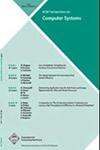Filesystem Fragmentation on Modern Storage Systems
IF 1.8
4区 计算机科学
Q2 COMPUTER SCIENCE, THEORY & METHODS
引用次数: 0
Abstract
Filesystem fragmentation has been one of the primary reasons for computer systems to get slower over time. However, there have been rapid changes in modern storage systems over the past decades, and modern storage devices such as solid state drives have different mechanisms to access data, compared with traditional rotational ones. In this paper, we revisit filesystem fragmentation on modern computer systems from both performance and fairness perspectives. According to our extensive experiments, filesystem fragmentation not only degrades I/O performance of modern storage devices, but also incurs various problems related to I/O fairness, such as performance interference. Unfortunately, conventional defragmentation tools are designed primarily for hard disk drives and thus generate an unnecessarily large amount of I/Os for data migration. To mitigate such problems, this paper present FragPicker, a new defragmentation tool for modern storage devices. FragPicker analyzes the I/O behaviors of each target application and defragments only necessary pieces of data whose migration can contribute to performance improvement, thereby effectively minimizing the I/O amount for defragmentation. Our evaluation with YCSB workload-C shows FragPicker reduces the total amount of I/O for defragmentation by around 66% and the elapsed time by around 84%, while showing a similar level of defragmentation effect.现代存储系统中的文件系统碎片化
随着时间的推移,文件系统碎片一直是计算机系统变慢的主要原因之一。然而,在过去的几十年里,现代存储系统发生了迅速的变化,与传统的旋转存储相比,现代存储设备(如固态驱动器)具有不同的访问数据的机制。在本文中,我们从性能和公平性的角度重新审视现代计算机系统上的文件系统碎片。根据我们广泛的实验,文件系统碎片不仅会降低现代存储设备的I/O性能,而且还会引发与I/O公平性相关的各种问题,例如性能干扰。不幸的是,传统的碎片整理工具主要是为硬盘驱动器设计的,因此为数据迁移产生了不必要的大量I/ o。为了减轻这些问题,本文提出了FragPicker,一个新的碎片整理工具,为现代存储设备。FragPicker分析每个目标应用程序的I/O行为,只对迁移有助于提高性能的必要数据片段进行碎片整理,从而有效地减少用于碎片整理的I/O量。我们对YCSB工作负载c的评估显示,FragPicker将碎片整理的I/O总量减少了约66%,运行时间减少了约84%,同时显示出类似水平的碎片整理效果。
本文章由计算机程序翻译,如有差异,请以英文原文为准。
求助全文
约1分钟内获得全文
求助全文
来源期刊

ACM Transactions on Computer Systems
工程技术-计算机:理论方法
CiteScore
4.00
自引率
0.00%
发文量
7
审稿时长
1 months
期刊介绍:
ACM Transactions on Computer Systems (TOCS) presents research and development results on the design, implementation, analysis, evaluation, and use of computer systems and systems software. The term "computer systems" is interpreted broadly and includes operating systems, systems architecture and hardware, distributed systems, optimizing compilers, and the interaction between systems and computer networks. Articles appearing in TOCS will tend either to present new techniques and concepts, or to report on experiences and experiments with actual systems. Insights useful to system designers, builders, and users will be emphasized.
TOCS publishes research and technical papers, both short and long. It includes technical correspondence to permit commentary on technical topics and on previously published papers.
 求助内容:
求助内容: 应助结果提醒方式:
应助结果提醒方式:


